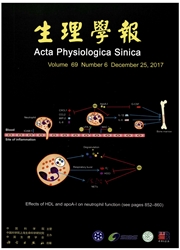

 中文摘要:
中文摘要:
本研究通过观察降低活性氧(reactive oxygen species,ROS)水平是否能阻断中枢尾加压素II(urotensin II,UII)的心血管效应,以验证ROS介导中枢UII作用的设想。以自发性高血压大鼠(spontaneously hypertensive rat,SHR)和Wistar-Kyoto(WKY)大鼠为实验对象,首先采用免疫组化观察SHR和WKY大鼠中枢相应心血管相关核团UII受体的表达,进一步观察侧脑室注射UII后各组大鼠中枢相关核团的超氧阴离子水平,观察侧脑室注射UII对平均动脉压(mean arterial pressure,MAP)的效应和给予超氧化物歧化酶(superoxide dismutase,SOD)类似物Tempol或UII受体拮抗剂Urantide预处理对UII效应的影响。结果显示:(1)在SHR和WKY大鼠头端延髓腹外侧(rostral ventrolateral medulla,RVLM)及孤束核(nucleus tractus solitarii,NTS)均有UII受体免疫阳性细胞表达,且SHR大鼠表达水平高于WKY大鼠(P〈0.05);(2)侧脑室注射UII(20nmol/10μL)引起血压升高(P〈0.05),其中SHR大鼠上的升压效应大于WKY大鼠(P〈0.05);(3)预先给予SHR大鼠Urantide(10nmol/10μL)或Tempol(15μmol/10μL)可阻断UII的升压效应;(4)在SHR大鼠侧脑室注射UII(20nmol/10μL/10min)后中枢RVLM超氧阴离子水平增加(P〈0.05)。以上结果表明,UII可促进中枢ROS的产生,ROS介导了SHR大鼠中枢UII引起的心血管效应。
 英文摘要:
英文摘要:
Central urotensin Ⅱ (UII) may participate in the regulation of cardiovascular functions by stimulating sympathy pathway.However,the central mechanism remained unknown.Recent studies have shown that brain reactive oxygen species (ROS) mediate the sympatho-excitatory effects.In the present study,we tested the hypothesis that ROS mediate central cardiovascular effects of UII.Ex-periments were conducted in Wistar-Kyoto (WKY) rats and spontaneously hypertensive rats (SHR).Immunocytochemistry,intracere-broventricular (icv) infusion and lucigenin-enhanced chemiluminescence assay were employed to detect UII receptor expression and ROS level,respectively.The following results were obtained:(1) Expressions of UII receptors of rostral ventrolateral medulla (RVLM) and nucleus tractus solitarii (NTS) were increased in SHR rats compared with WKY rats (P〈0.05).(2) UII (icv) significantly increased mean arterial pressure (MAP) (P〈0.05),and the effect of UII was significantly more pronounced in SHR rats than that in WKY rats (P〈0.05);(3) Tempol (a superoxide dismutase mimic) or Urantide (an antagonist of UII receptor) pretreatments eliminated the pressor effect of UII (P〈0.05) in SHR rats;(4) Brain superoxide level was increased in UII-treated SHR rats compared with that in cerebrospinal fluid (CSF)-treated SHR rats (P〈0.05).These results indicate that ROS mediate central cardiovascular effects of UII in SHR rats and provide evidence for a novel relationship between UII and ROS.
 同期刊论文项目
同期刊论文项目
 同项目期刊论文
同项目期刊论文
 期刊信息
期刊信息
